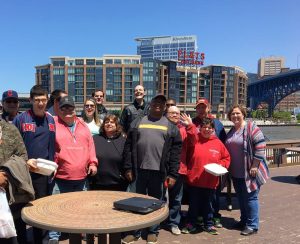 People like to identify themselves using job titles. Our sense of integrity seems tied to our specialties. But for those with faith, our integrity must come from collaborating with each other to make something out of our brokenness. Yes, we’re broken, but we’re also designed to be interlocking pieces in God’s puzzle of a universe. We serve God’s purpose by serving each other’s “special needs.” We’ve come to think that those with special needs are people with learning disabilities—people out of sync with the rest of us “normal” folks. But as part of God’s universe, we must realize we all have special needs that require learning how to interface with each other. By filling each other’s gaps we maintain the integrity God intended.
People like to identify themselves using job titles. Our sense of integrity seems tied to our specialties. But for those with faith, our integrity must come from collaborating with each other to make something out of our brokenness. Yes, we’re broken, but we’re also designed to be interlocking pieces in God’s puzzle of a universe. We serve God’s purpose by serving each other’s “special needs.” We’ve come to think that those with special needs are people with learning disabilities—people out of sync with the rest of us “normal” folks. But as part of God’s universe, we must realize we all have special needs that require learning how to interface with each other. By filling each other’s gaps we maintain the integrity God intended.
That isn’t to say we don’t have specialties. Throughout both the Old and New Testaments, God shows us how we fit into His grand scheme of integrity. This Sunday being the Solemnity of Jesus Christ, King of the Universe, it seems appropriate that the first reading has the prophet Ezekiel telling us how we fit in that universe in relation to God’s Good Shepherd. Under the classification of sheep, we’re either goats or rams (Ez 34:11-12, 15-17) .
Thus says the Lord GOD: I myself will look after and tend my sheep. … I myself will pasture my sheep; I myself will give them rest … The lost I will seek out, the strayed I will bring back, the injured I will bind up, the sick I will heal, … As for you, my sheep, says the Lord GOD, I will judge between one sheep and another, between rams and goats.
Elsewhere in Ezekiel he talks about another specialty: corrupt public officials who are like wolves—“tearing prey, shedding blood and destroying lives to extort profit.”
We have been promised that the pieces of God’s puzzle of a universe will come together once such enemies who separate the rest of us from a solution have been conquered. The ultimate enemy is death, as Paul tells the Corinthians in Sunday’s second reading (1 Cor 15:20-26, 28):
The last enemy to be destroyed is death. When everything is subjected to him, then the Son himself will also be subjected to the one who subjected everything to him, so that God may be all in all.
Our Gospel reading gives us a taste of how God will judge the integrity of His universe (Mt 25:31-46). There are no surprises. God made very clear, through His prophets, what’s expected of us throughout life: to be His answer to the call of His lost sheep.
‘Come, you who are blessed by my Father. Inherit the kingdom prepared for you from the foundation of the world. For I was hungry and you gave me food, I was thirsty and you gave me drink, a stranger and you welcomed me, naked and you clothed me, ill and you cared for me, in prison and you visited me.’ Then the righteous will answer him and say, ‘Lord, when did we see you hungry and feed you, or thirsty and give you drink? When did we see you a stranger and welcome you, or naked and clothe you? When did we see you ill or in prison, and visit you?’ And the king will say to them in reply, ‘Amen, I say to you, whatever you did for one of the least brothers of mine, you did for me.’
In our Creator’s eyes, all of our needs are special—going well beyond the basic existential needs Jesus listed here. We may all be broken into pieces but somehow we are designed to fit God’s puzzle—so it’s pretty rich when one of us who is broken says that someone with “learning disabilities” has special needs. We then make matters worse when we place “special” barriers around those brothers and sisters and render them invisible—or rather, make ourselves blind to them. Such barriers between all of us oddly-shaped pieces must fall before God can be, as Paul said, “all in all.”
Parents of people with learning disabilities have been blessed with the same kind of hope as Paul. They have the privilege of seeing God at work through the professionals and volunteers who show their sons and daughters they really do fit in one universe. These caretakers embrace the duties they signed up for while also finding the funding from private and public sources to help make their work possible. The challenge comes when those sources are focused on more visible and more certain returns on their investments.
 Case in point: The staff and students in Catholic Charities’ Disability Services program are a great example of how people with special needs form a community whose outreach to the world around them has been paying off for many years. These people share Saturdays together, strengthening the bond with each other in a classroom setting and with our society via outreach efforts such as educational field trips. They rely on funding from parents and donors throughout the year, but this Tuesday opens the donation door wider for more people to play an important part in building on these educational experiences. Starting at 12am on November 28th until 11:59pm, people can help the people who make this program work by joining me in visiting the ability Services #weGiveCatholic page and making a donation. Funding will go toward transportation costs for community outreach, the mission of which is to broaden opportunities for persons with disabilities to participate in community events.
Case in point: The staff and students in Catholic Charities’ Disability Services program are a great example of how people with special needs form a community whose outreach to the world around them has been paying off for many years. These people share Saturdays together, strengthening the bond with each other in a classroom setting and with our society via outreach efforts such as educational field trips. They rely on funding from parents and donors throughout the year, but this Tuesday opens the donation door wider for more people to play an important part in building on these educational experiences. Starting at 12am on November 28th until 11:59pm, people can help the people who make this program work by joining me in visiting the ability Services #weGiveCatholic page and making a donation. Funding will go toward transportation costs for community outreach, the mission of which is to broaden opportunities for persons with disabilities to participate in community events.
Let’s face it; fundraising isn’t always fun. Let’s close with a memorable scene from a little-known film from the 60s that shows why people close to people with learning disabilities are so passionate about uniting them with the rest of us broken pieces of humanity. “A Child is Waiting” was made at the height of the civil rights era when barriers were more common among more classes of people. It starred Burt Lancaster and Judy Garland, both of whom invested their hearts in making visible a corner of God’s universe where civil rights weren’t even considered an issue—and “the mentally retarded,” were considered “sick,” and rarely accorded either civility or rights. Lancaster plays the head of an experimental program and, while he is learning how to improve his own skills, he must convince a group of bean counters that the students he serves represent a good return on their investment. Watch what happens when one of these suits calls the kids in Lancaster’s program “living vegetables.” The passion Burt displays offers one of Hollywood’s better interpretations of a face God must make while working on this puzzle called humanity.
–Tom Andel